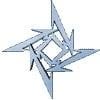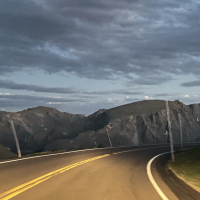Share your photos by tagging us and using the hashtag #BigGreenEgg.
Want to see how the EGG is made? Click to Watch
What's the reverse sear method and what does it do?
Comments
-
I think on the reverse sear you let your seasonings have time to actually work rather than searing first and scorching your seasonings. But that is just me with no scientific findings to back it up.
 -----------------------------------------analyze adapt overcome2008 -Large BGE. 2013- Small BGE and 2015 - Mini. Henderson, Ky.
-----------------------------------------analyze adapt overcome2008 -Large BGE. 2013- Small BGE and 2015 - Mini. Henderson, Ky. -
If you make thicker steaks, the reverse sear will shine, thiner steaks, stay with the T-rex method. Bison is great, I usually cook 1.5 - 2" thick steaks reverse sear method so the rubs do their thing and I can control the final temp much easier. Such a tasty meat, full of flavourLarge BGE 2011, XL BGE 2015, Mini Max 2015, and member of the "North of the Border Smokin Squad" Canadian Outdoor Chef from London, Ontario, Canada
https://www.flickr.com/photos/monty77/ -
Just did my first reverse sear tonight. 3.4 lb, 2 rib roast. Probably about 4" thick. Got it a couple of nights ago. It was dry when I got it; my guess is that it was unwrapped in the store's meat cooler before they moved it and wrapped it up.
Seasoned it up with Oakridge Beef and Pork Rub. Put on as much that would stick. Put it back in my fridge with a breathable cover. After 18 hours I pulled is out and added more rub.
6 hours later I was ready to cook it. Got the Egg going with just a couple of small pieces of smoking wood. Since this was going to be in the Egg for a few hours not much smoking wood is needed. Put in the plate setter legs up. Used the BGE ceramic feet on top and then a drip pan on top of that. Used the V-rack and set that into the drip pan. My goal was to cook the rib roast at around 250*. The Egg was at 300*; no big deal but I was able to eventually get it down. Cooked it for 2 hours or so without lifting the lid. Probed the meat and it was at 105*. Left it go another 20 minutes. I'm not some one who needs to cook within 1 degree. Measured it again and it was at 115*. Removed the roast and the plate setter. Added some bigger lump (the initial burn was 80% leftover) and brought it up to 700*; enough to clean the cooking grate. Backed it back down to 500* and did the reverse sear. Smoke was pouring out of the top. Raised the lid and there was a fire ball. That seldom happens on my small egg. Closed the vents and reopened after a few seconds. Flipped the roast and opened up the vents to sear the other side. The sides of the roast had great grill marks. The sugar in the rub had caramelized. Let it set on a plate covered in aluminum foil while I cooked some string beans. I did a probe into the center and it was 127*. While it was 'dry' to begin with, it had plenty of juices when cooked.
To make a long story short, the reverse sear was the best thing I could have done to this roast.
-
Buzilo said:Chelnerul, that was a great article. I have the XL egg and I am assuming that I should use the plate setter, get it to 250 cook the steak for 4 min each side and take the plate setter out, wrap the steak in foil, turn up the egg to 600+ and get the steak on for another 2/3 min each side. Is this right? Also, when I sear the steak at 600 should I keep the lid open?
two temperature cooking is great for thicker steaks. Low temp to cook the interior to an uniform doneness and high temp for getting a flavorful crust. I always use this for steaks 1.5" and greater. It is less useful on thinner cuts. It looks like the steaks you ordered may be 3/4 or 1" thick. If so, two temp cooking may not be worth fooling around with.Southeast Florida - LBGE
In cooking, often we implement steps for which we have no explanations other than ‘that’s what everybody else does’ or ‘that’s what I have been told.’ Dare to think for yourself. -
I understand letting big roasts, turkeys, etc "rest", I've never understood it for steak.
Maybe I don't eat my steak fast enough, maybe I enjoy chewing each bite for too long. I don't know.
I do know that I find that no matter how quickly I go from grill or CI pan or whatever to my plate and start digging in right away, long before I finish my steak it is dropped to room temp (aka it's cold). It tastes the best to me when it is still hot or warm.
I would probably enjoy my steak better if I cut it into 4 chunks, cook the first chunk, put it on my plate and put another chunk on the grill/frying pan. Cook chunk 2 while enjoying chunk 1, then when I'm done with chunk #1, pull #2 off the heat, put #3 on the heat and start eating #2, and so on. Of course, timing would have to be taken into account to be sure I'm not over-cooking any of the chunks, when it comes to steak, I find it hard to be under-cooked, I'll eat them very rare.
Large BGE in a Sole' Gourmet Table
Using the Black Cast Iron grill, Plate Setter,
and a BBQ Guru temp controller.
Medium BGE in custom modified off-road nest.
Black Cast Iron grill, Plate Setter, and a Party-Q temp controller.
Location: somewhere West of the Mason-Dixon Line -
Yes, that's almost exactly how I do it, though I don't foil. I smoke the thick steaks (also on an XL) until they're about 115, then go to 600+ with the lid open for a couple minutes each side, as well as on the sides for even cooking throughout. I'm thinking of getting a cast iron griddle as well to ensure an even cook.Buzilo said:Chelnerul, that was a great article. I have the XL egg and I am assuming that I should use the plate setter, get it to 250 cook the steak for 4 min each side and take the plate setter out, wrap the steak in foil, turn up the egg to 600+ and get the steak on for another 2/3 min each side. Is this right? Also, when I sear the steak at 600 should I keep the lid open?
Glad you found the article useful - I've learned a ton of stuff from Meathead over at AmazingRibs.com; he is a true BBQ/Grill science geek.
Manning our FOB in occupied Northern Virginia... -
I do the rotating portion of a RS at 400F, no point in 250F, just takes longer.
-
Buzilo said:Is the plate setter necessary or can I just use one side of the egg to pile up the charcoal?
You could just raise the grid for the low and slow part. I have a AR with a grid extender and I cook mine high in the dome before the sear on a rack close to the lump.Dave - Austin, TX -
Bison steak - Reverse sear... worked like a charm!
-
-
Dude, that deserves its own thread, don't be shy, be proud and brag! That looks great!
-
Done deal!
-
@Buzilo, looks great. If you have any of those left you should try caveman. Pull at 115°-125°IT and eat it Blue to rare.Steven
Mini Max with Woo stone combo, LBGE, iGrill 2, Plate Setter,
two cotton pot holders to handle PS
Banner, Wyoming -
I am not crazy on rare.
Categories
- All Categories
- 184K EggHead Forum
- 16.1K Forum List
- 461 EGGtoberfest
- 1.9K Forum Feedback
- 10.5K Off Topic
- 2.4K EGG Table Forum
- 1 Rules & Disclaimer
- 9.2K Cookbook
- 15 Valentines Day
- 118 Holiday Recipes
- 348 Appetizers
- 521 Baking
- 2.5K Beef
- 90 Desserts
- 167 Lamb
- 2.4K Pork
- 1.5K Poultry
- 33 Salads and Dressings
- 322 Sauces, Rubs, Marinades
- 548 Seafood
- 175 Sides
- 122 Soups, Stews, Chilis
- 40 Vegetarian
- 103 Vegetables
- 315 Health
- 293 Weight Loss Forum









